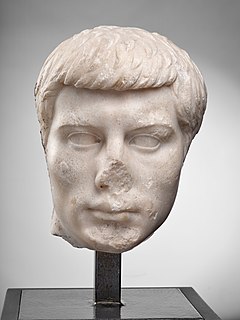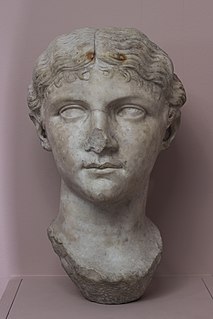
Agrippina "the Elder" was a prominent member of the Julio-Claudian dynasty. She was the daughter of Marcus Vipsanius Agrippa and Augustus' daughter, Julia the Elder. Her brothers Lucius and Gaius Caesar were the adoptive sons of Augustus, and were his heirs until their deaths in AD 2 and 4, respectively. Following their deaths, her second cousin Germanicus was made the adoptive son of Tiberius, Augustus' stepson, as part of Augustus' succession scheme in the adoptions of AD 4. As a result of the adoption, Agrippina was wed to Germanicus in order to bring him closer to the Julian family.

The Julio-Claudian dynasty comprised the first five Roman emperors: Augustus, Tiberius, Caligula, Claudius, and Nero.

Tiberius Caesar Augustus was the second Roman emperor. He reigned from AD 14 until 37, succeeding his stepfather, the first Roman emperor Augustus.

Pūblius Ovidius Nāsō, known in English as Ovid, was a Roman poet who lived during the reign of Augustus. He was a contemporary of the older Virgil and Horace, with whom he is often ranked as one of the three canonical poets of Latin literature. The Imperial scholar Quintilian considered him the last of the Latin love elegists. Although Ovid enjoyed enormous popularity during his lifetime, the emperor Augustus banished him to a remote province on the Black Sea, where he remained until his death.

Livia Drusilla was Roman empress from 27 BC to AD 14 as the wife of Emperor Augustus. She was known as Julia Augusta after her formal adoption into the Julian family in 14 BC.

Lucius Aelius Seianus, commonly known as Sejanus, was a Roman soldier, friend and confidant of the Roman Emperor Tiberius. An equestrian by birth, Sejanus rose to power as prefect of the Roman imperial bodyguard, known as the Praetorian Guard, of which he was commander from AD 14 until his death in AD 31.
Marcus Valerius Messalla Corvinus was a Roman general, author, and patron of literature and art.

Tiberius Julius Caesar Nero Gemellus, known as Tiberius Gemellus was the son of Drusus and Livilla, the grandson of the Emperor Tiberius, and the cousin of the Emperor Caligula. Gemellus is a nickname meaning "the twin". His twin brother, Tiberius Claudius Caesar Germanicus II Gemellus, died as a young child in 23. His father and older cousins died, and are suspected by contemporary sources as having been systematically eliminated by the powerful praetorian prefect Sejanus. Their removal allowed Gemellus and Caligula to be named joint-heirs by Tiberius in 35, a decision that ultimately resulted in Caligula assuming power and having Gemellus killed in late 37 or early 38.

Claudia Livia Julia was the only daughter of Nero Claudius Drusus and Antonia Minor and sister of the Roman Emperor Claudius and general Germanicus, and thus the paternal aunt of the emperor Caligula and maternal great-aunt of emperor Nero, as well as the niece and daughter-in-law of Tiberius. She was named after her grandmother, Augustus' wife Livia Drusilla, and commonly known by her family nickname Livilla. She was born after Germanicus and before Claudius.

Drusus Julius Caesar, was the son of Emperor Tiberius, and heir to the Roman Empire following the death of his adoptive brother Germanicus in AD 19.

Drusus (Julius) Caesar was the adopted grandson and heir of the Roman emperor Tiberius, alongside his brother Nero. Born into the prominent Julio-Claudian dynasty, Drusus was the son of Tiberius' general and heir, Germanicus. After the deaths of his father and of Tiberius' son, Drusus the Younger, Drusus and his brother Nero Caesar were adopted together by Tiberius in September AD 23. As a result of being heirs of the emperor, he and his brother enjoyed accelerated political careers.

Nero Julius Caesar was the adopted grandson and heir of the Roman Emperor Tiberius, alongside his brother Drusus. Born into the prominent Julio-Claudian dynasty, Nero was the son of Tiberius' general and heir, Germanicus. After the deaths of his father and of Tiberius' son, Drusus the Younger, Nero and his brother Drusus were adopted together by Tiberius in September AD 23. As a result of being heirs of the emperor, he and his brother enjoyed accelerated political careers.
Pomponia Graecina was a noble Roman woman of the 1st century who was related to the Julio-Claudian dynasty. She was the wife of Aulus Plautius, the general who led the Roman conquest of Britain in 43 AD, and was renowned as one of the few people who dared to publicly mourn the death of a kinswoman killed by the Imperial family. It has been speculated that she was an early Christian. She is identified by some as Lucina or Lucy, a saint honoured by the Roman Catholic Church.

Time to Depart is a 1995 historical mystery crime novel by Lindsey Davis and the seventh book of the Marcus Didius Falco Mysteries series. Set in Rome during AD 72, the novel stars Marcus Didius Falco, an informer and imperial agent. The title refers to the law which stated that no Roman citizen who had been sentenced to death might be arrested, even after the verdict, until he has been given time to depart, the idea being that for a Roman citizen to choose exile outside the boundaries of the Empire would have been a fate worse than death itself.

Three Hands in the Fountain is a 1997 historical mystery crime novel by Lindsey Davis and the ninth book of the Marcus Didius Falco Mysteries series. Set in Rome between August and October, AD 73, the novel stars Marcus Didius Falco, informer and imperial agent. The title alludes to the song "Three Coins in the Fountain" as well as to the macabre discovery which triggers Falco's investigation.

Ode to a Banker is a 2000 historical mystery crime novel by Lindsey Davis and the 12th book of the Marcus Didius Falco Mysteries series. Set in Rome between July and August AD 74, the novel stars Marcus Didius Falco, informer and imperial agent. The title refers to both the poetry that leads Falco to the Chrysippus scriptorum and to the bank that is the Chrysippus family's other business.
Corvinus or Corvin may refer to:
Apicata was a woman of the 1st century AD in ancient Rome. She was married to Sejanus, friend and confidant of the Roman Emperor Tiberius.

Tiberius Claudius Drusus was the eldest son of the Roman Emperor Claudius with his first wife Plautia Urgulanilla. He had one younger sister, Claudia, who was repudiated by Claudius along with Plautia.














